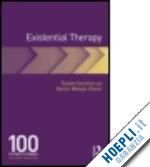Author Biographies. Introduction. Part I: Existentialism – Inception To Present Day. What Is Existentialism? Historical Background, Philosophical Foundations. The Basis Of An Existential Approach To Therapy. Existential Therapy Here And Now. Part II: Theoretical Assumptions. Existence And Essence And The Concept Of Self. Being-In-The-World. Being-In-The-World-With-Others. The Universals Of Human Existence. The Ontic And The Ontological. Existence Precedes Essence – Creating A Self Out Of Nothing. The Contribution Of Phenomenology. The Phenomenological Method. Intentionality. Noema And Noesis. Relatedness And The Formation Of The Self. Intersubjectivity. Freedom, Choice, And Responsibility. Throwness, Limitations And Finitude. The Centrality Of Anxiety, Loss And Suffering. Death And Nothingness. Existential Guilt. Authenticity And Inauthenticity, Bad Faith And Good Faith. Meaning And Absurdity In A Meaningless Cosmos. Temporality And Orientation Towards The Future. Embodiment And The World. An Existential Perspective On Sexuality. Consciousness And The Unconscious. Absolute Truth, The Not-Knowing And The Un-Knowing. A Theory Of Emotions. The Four Worlds: Physical, Personal, Social, Spiritual. Worlding, Worldview, Values And Sedimented Beliefs. The I, You And We Focus. Antipsychiatry And The Social Construction Of Madness. Language And Existentialism. Part III: Existential Phenomenological Therapy In Practice. The Foundational Elements Of An Existential Therapeutic Relationship. The Therapy Environment. The Initial Encounter. The Role Of The Therapist. The Role Of The Client. Contracting And Boundary Setting. Assessment From An Existential Perspective. The Aim Of Existential Psychotherapy. The Centrality Of The Therapeutic Encounter. Key Therapeutic Tasks. Exploring The Four Worlds. Mapping The Client’s Worldview. Tuning In To Emotions. Presence, Immediacy, And Moving To An I-Thou. Making The Implicit, Explicit. Choosing And Changing. Creating/Finding A Project, Meaning And Values. Confronting Freedom And Limitations. Developing An Appreciation For The Authentic Self–In-Relation. Dealing With Breakdowns And Crises. Being And Non-Being And The Courage To Be. Ending Therapy. Working Existentially With What The Client Brings. Exploring Isolation And Loneliness. Working With Unhappiness And Dis-Ease. The Lessons Of Guilt And Shame. Understanding And Managing Dilemmas And Conflict. Working With Paradox, Polarities, And Existential Tensions. Coping With Death, Loss, And Suffering, And The Potential For Growth. Supporting The Client Living With Serious Or Terminal Illness. Using Dreams And Imagination To Elucidate The Client’s Way Of Being-In-The-World. Dealing With Voices And Hallucinations In Existential Therapy. Working With Anxiety, Existential, Neurotic And Normal. Working With Addictions. Working With Depression. An Existential Understanding Of Trauma, And How To Engage With It. An Existential Perspective On Self-Harm. Using Philosophy To Inform Work With Suicide And Suicidal Ideation. Key Competencies Of The Existential Therapist. Developing A Personal Existential Therapy. Adopting An Existential Attitude. Descriptive Interpretation Rather Than Explanation. Being With And Being For The Client. Taking The Role Of The Other. Challenging With Curiosity And Directness. Assuming A Dialogical Attitude. Normalising Verses Diagnosing - An Existential Perspective. Working Existentially In A Time-Limited Way. Using Myth, Metaphor And Philosophy.Exploring Sexuality, Gender And Identity In Existential Terms. Exploring Sexuality, Gender And Identity In Existential Terms. Leaping Ahead Versus Leaping In. Wisdom And The Passionate Life. Working Existentially With Groups.Existential Relationship Therapy. Part IV: Ethics And Existential Therapy. Choosing Who To Work With. Confidentiality, Note Taking And Relations With Outside Agencies. The Issue Of Power In Existential Therapy. Self-Disclosure In An Existential Framework. Existential Supervision Skills. Life After Existential Therapy. Part 5: Bringing It All Together. Critical Perspectives On Existential Psychotherapy. A Critique Of The Dominant Scientific Paradigm In Psychotherapy. Research And The Effectiveness Of Existential Therapy. Shared Origins, Multiple Directions. The British School Of Existential Psychotherapy. The European School Of Existential Therapy. The North American School Of Existential Therapy. Existentialism And Other Therapeutic Orientations. The Case For Existentialism As An Over-Arching Framework.











